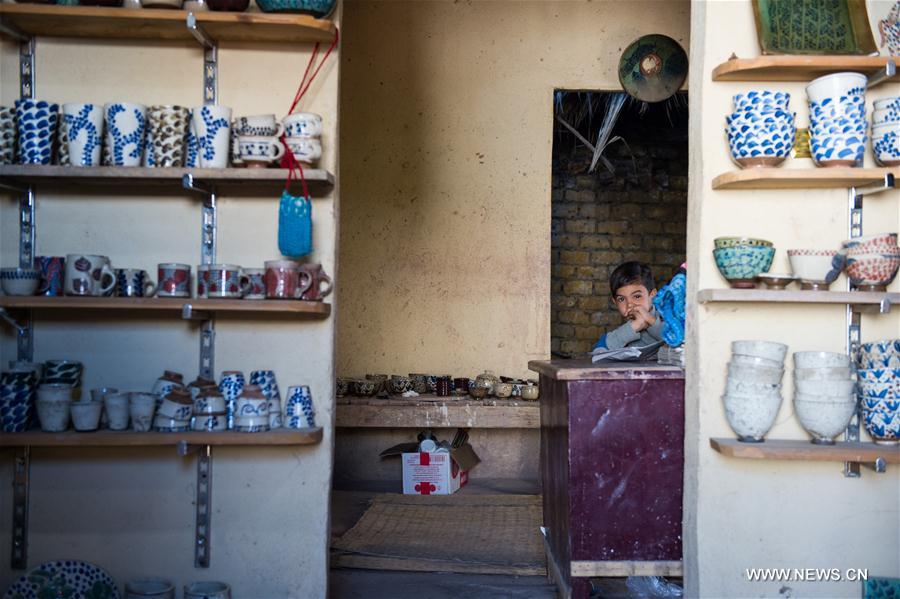
An Egyptian boy waits for customers at a pottery workshop in Fayoum governorate, 100 km southwest of Cairo, capital of Egypt, on Dec. 3, 2016. Fayoum governorate, Egypt's renowned Tunis village, has won fame over the past three decades for its precious colored pottery works and unique beauty. With its unpaved lanes, the small village of Tunis is located on a sand hill in Fayoum oasis and surrounded by fertile farmlands, featuring a superb view of the large salty Lake Qarun and endless desert. Pottery manufacture arrived at the village in the 1980s when Evelyne Porret, a potter from Switzerland, moved to the village and built a pottery studio. Nearly all local potters learned and taught at the pottery school. Evelyne's school has totally changed the lives of villagers as it turned the village from an unknown rural community to a famous artistic and industrial place. Generation by generation, artists graduated from the small school and then earned their living by injecting magic to the raw clay. They changed their villas into workshops, making their hometown just like a retreat from the turmoil of the world. Except for those attractive workshops and the pottery arts, the eye-catching beauty of the village has made it an adorable tourist hub. (Xinhua/Meng Tao)
by Xinhua Writer Wang Xue
FAYOUM, Egypt, Dec. 5 (Xinhua) -- Mahmoud el-Sherif proudly watched his seven-year-old son Adam magically throwing a clay pot on the wheel at his pottery workshop in Egypt's Fayoum governorate.
"Like father, like son," 38-year-old el-Sherif told Xinhua as he was checking his son's piece of art.
El-Sherif is one of the first generation of potters in Egypt's renowned Tunis village, 100 km southwest of Cairo, which has won fame over the past three decades for its precious colored pottery works and unique beauty.
With its unpaved lanes, the small village of Tunis is located on a sand hill in Fayoum oasis and surrounded by fertile farmlands, featuring a superb view of the large salty Lake Qarun and endless desert.
Pottery manufacture arrived at the village in the 1980s when Evelyne Porret, a potter from Switzerland, moved to the village and built a pottery studio.
"She was the first potter here and she trained many of the village's children," El-Sherif told Xinhua. "Most of the students ended up creating their own pottery studio, including me."
Nearly all local potters learned and taught at the pottery school. Students can earn a percentage of the proceeds if the pottery they produce is sold. Younger students attend pottery school during weekends and work an average of six hours a day.
In this way, Evelyne's school has totally changed the lives of villagers as it turned the village from an unknown rural community to a famous artistic and industrial place.
"Pottery and tourism brought fame to the village," el-Sherif added. "Now everyone in Egypt knows about us as we receive dozens of foreign and local tourists every day. Foreigners fly thousands of miles to buy our products."
Generation by generation, artists graduated from the small school and then earned their living by injecting magic to the raw clay. They changed their villas into workshops, making their hometown just like a retreat from the turmoil of the world.
Except for those attractive workshops and the pottery arts, the eye-catching beauty of the village has made it an adorable tourist hub.
Walking along those narrow street surrounded by cute villas and green trees, the peace in this village has attracted many famous Egyptian poets, artists and writers to settle down and build their homes, as well as an Art Center, which in turn contributes to the vigorous artistic sense here.
"I'm one of the people who love this village and I started my caricature gallery here years ago," famous Egyptian contemporary painter Mohammed Abla told Xinhua as he toured around the village. "Tunis is a very impressive model of Egypt's rural community that should be followed by the other villages."
For Abla, known for his paintings of abstract scenery, the tranquil village and the art that can be effortlessly seen around are the source of his inspiration.
"The village is a little piece of paradise. These small workshops added a fabulous touch of irresistible beauty of Tunis," Abla said as a number of local villagers approached to greet their famous neighbor.
Now, a large segment of residents work in the tourism industry as small lodges and hotels located amid the wonderful green areas and fields provide tourists with rare insight to rural life.
Christina, a French lady who has been living in Cairo for two years, said the pottery from Tunis is very famous, adding that she seizes every opportunity to come to the village to buy some matchless pieces.
"The design of pottery here is very special. I cannot find it anywhere except here," she said as she recommended a big blue fruit plate to a friend of hers at a pottery store next to el-Sherif's.
Christina said her love of pottery art makes her travel around the world to attend pottery festivals, but she cannot find "the beauty of Tunis pottery anywhere else."
Her admiration is truely well-founded in el-Sherif's shop. His style of pottery draws upon ancient Islamic art as well as scenes from daily village life such as palm trees, donkeys, cows and camels.
"I was taught to express my creativity in my own unique way. This is what distinguishes artists here," the man said. He also told Xinhua that every workshop is different, depending on the inspiration of its owner.
And el-Sherif's shop can always attract foreign visitors to buy some of his great pieces of art. Since he started his atelier in Tunis 12 years ago, el-Sherif has displayed his works in a number of local and international exhibitions, such as Cairo's Islamic Museum and Arab World Institute in Paris.
In an attempt to highlight and promote their pottery and tourism business, Tunis residents host an annual festival visited by Egyptians and foreigners alike.
"The festival is held mostly in December every year," el-Sherif said. "It's just like an open invitation to come to our lovely village to enjoy the creation of God as well as the creation of our hands."











